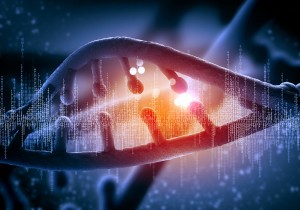 Despite substantial research showing that obesity is a complex disease influenced by a wide variety of factors, many people still associate obesity with “a lack of self control, and just eating too much”. While the choices someone makes are always part of the equation, there are significant portions of the equation that are yet to be discovered. For example, many different gene defects could be involved in obesity, most of which are very rare, according to a new study. “Rare genetic defects account for something like 95 percent of the total problem. That is a very unwelcome fact for most people, who would like to think an easy solution is close at hand”, said lead study author, Professor Lesley Campbell, Director of Diabetes Services at St. Vincent’s Hospital.
Despite substantial research showing that obesity is a complex disease influenced by a wide variety of factors, many people still associate obesity with “a lack of self control, and just eating too much”. While the choices someone makes are always part of the equation, there are significant portions of the equation that are yet to be discovered. For example, many different gene defects could be involved in obesity, most of which are very rare, according to a new study. “Rare genetic defects account for something like 95 percent of the total problem. That is a very unwelcome fact for most people, who would like to think an easy solution is close at hand”, said lead study author, Professor Lesley Campbell, Director of Diabetes Services at St. Vincent’s Hospital.
The study used detailed information about more than 300 healthy people with a family history of type 2 diabetes,which included their body shape, size and composition. Specifically, Professor Campbells’ research focused on people who are genetically at risk of developing type 2 diabetes and are overweight or obese before they get the disease. The study explains that genes bring out underlying predispositions, and there are fairly predictable interactions between genes and environment. “So if people are predisposed to a strong appetite, large amounts of easily available, highly palatable, food are likely to make them fat,” said Prof. Campbell. Many obese people have strong hunger genes and we live in an obesogenic environment that rewards obesity. In times of food scarcity or famine, these genes would serve these people well–they would survive, while leaner individuals would likely perish. Our environment is so different now, that these genetic influences are more detrimental than helpful.
This new finding that there are numerous gene defects involved in obesity is unwelcome to those hoping that a universal therapy may solve the obesity problem. Dealing with a multitude of rare gene defects poses a significant challenge. Since there is no single cause of obesity, there is likely no single way to address it. The findings were published online in the journal PLOS ONE.
We spoke with Dr. Daniel Davis, expert bariatric surgeon in Stamford, CT, about the findings. He said, “This study highlights the significant role genes play in the pathogenesis of obesity. Studies have demonstrated genetic mutations can alter appetite and metabolism and can predispose to obesity under certain dietary or environmental conditions. There are many genetic variations that can predispose an individual to obesity, finding a single treatment will be highly unlikely. Until we have routine genetic testing for obesity, the best chance we have in fighting this disease will rely on physicians collecting family history in order to identify those at high risk for obesity. Prevention by healthy eating and increasing daily physical activity will help those identified as being high risk while also providing effective treatment such as weight loss surgery for those already afflicted with this disease will be the cornerstone of battling the obesity epidemic.”
Related Reading: Study Links Rare Gene Mutation with Obesity






Weight Loss Studies & Clinical